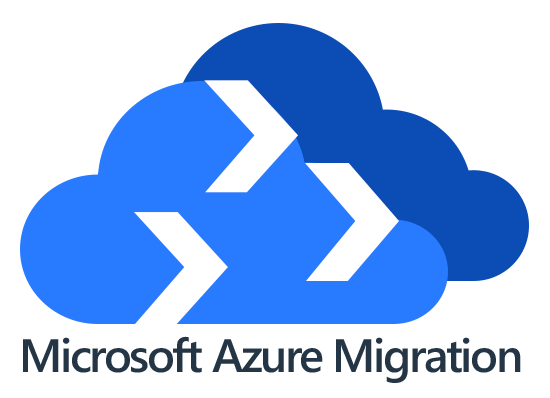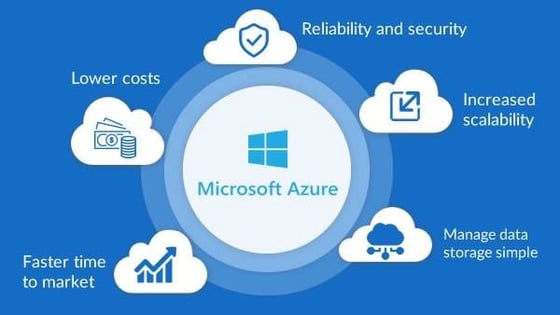Cloud computing is a combination of functions that help provide a network with its technical operations. This is useful to companies who have large amounts of data and active communication. These functions are possible by utilizing storage databases, servers, networking, software, analytics and intelligence over the internet. These services provide flexibility of resources and economies of scale.
One of the most influential companies introducing cloud services is Microsoft Azure.

Microsoft Azure: Origins
Microsoft Azure entered the cloud market on October 28, 2008. At first, Azure was designed as a cloud operating system targeted for Business and Developers without additional coding. Azure’s inception was a response to competition with Amazon and Google starting in the field.
Windows Azure was the beginning of Cloud Platform as a Service (PaaS) and while in its infancy, the project went by the code name, “Project Red Dog.”
Azure currently offers over 600 services including Software as a Service (SaaS), Platform as a Service (PaaS) and Infrastructure as a Service (IaaS), which are technology based.
Why Azure?
Organizations across the globe are prospering with business solutions that run in the cloud. Azure’s cutting-edge features have provided the majority share of enterprises who have secure cloud applications.
Stats show that 95% of Fortune 500 companies are using Azure as their cloud provider. Microsoft’s cloud network ranges over 54 regions and 140 countries, which is larger than any other provider.
These are a few reasons why Azure has become a top performer in the market:
Scalability:
Azures apps can start with a user base as small as 5 and go all the way up to 5 million. Its storage allows for safe transfer to the cloud.
Hybridization:
Azure’s hybrid option sets it apart from other providers. This means Azure is able to facilitate between maintenance at a physical location in accordance with the cloud. Azure uses an array of hybrid connections: virtual private networks (VPNs), caches, content delivery networks (CDNs), and ExpressRoute connections to optimize customer performance and delivery.
Integration:
Many businesses run on Office 365. By investing in Azure, your organization gets a cloud platform that seamlessly integrates with other Microsoft products. This use of Azure simplifies operations by using the same physical machines as the ones in the office.
Cost Efficiency:
Microsoft’s model of paying for what's used is set to build resources using Azure services. This drops the IT costs to a very small number, as infrastructure is taken care of by employees at Microsoft's headquarters. It connects datacenters to the cloud with ease.

TYPES OF CLOUD COMPUTING
Public Cloud
Public clouds are run by third-party cloud service providers who offer their resources wirelessly, including servers and storage. Microsoft Azure is an example of a public cloud.
When using a public cloud, all hardware software, and supporting infrastructure is owned and managed by the cloud provider. You can access these services and manage your account using a web browser.
Private Cloud
Private clouds are only used by a single business or organization. A private cloud is usually located on the company’s on-site datacenter. Some companies will pay third-party service providers to host their private cloud. This type of structure is operated on a private network.
Hybrid Cloud
Hybrid clouds combine public and private options by incorporating technology that allows applications to be shared. With this flexibility, a hybrid cloud gives your business more options, helps optimize the current network, improves the security of the environment, and aligns with compliance structure.

Cloud Services
Azure is the public cloud computing platform of Microsoft, and it offers an array of different services.
Cloud services fall into four broad categories: infrastructure as a service (IaaS), platform as a service (PaaS), serverless, and software as a service (SaaS). This is also known as, “the stack.” Knowing what they are and how they’re different makes it easier to accomplish your business goals.
Infrastructure as a Service (IaaS)
This is the most basic category of cloud computing services. With IaaS, you will rent IT infrastructure, virtual machines, operating systems and storage from a cloud provider and use a pay-as-you go plan.
Platform as a service (PaaS)
Platform as a service refers to services that are on demand for its users. PaaS is designed for developers to quickly create web or mobile apps, without the ongoing services and maintenance needed for larger businesses.
Serverless computing
Overlapping with PaaS, this option generally fits best for app builders. It's predicated on managing the servers and infrastructure required to do so. Cloud providers handle the setup, capacity planning, and server management for you. Serverless architectures are highly scalable and event-driven, only using resources when a specific function or trigger occurs.
Software as a service (SaaS)
SaaS is used with software applications over the Internet, on demand and typically on a subscription basis.
With SaaS, cloud providers manage the software, applications, infrastructure, as well as handle any maintenance, like software upgrades and security patching. Users connect to this method using a web browser on PC or tablet.
Microsoft Azure: Features
Azure is integrated with other applications that are used by a majority of organizations. Microsoft also gives significant discounts to its customers on service contracts.
Features:
- Ability for developers and users to create, maintain and deploy applications
- Scalable cloud computing platform across frameworks
- Coordination with Microsoft legacy apps
- Awareness and implementation of enterprise needs
- Simple one-click migrations
- Conversion of on-prem licenses to the cloud
- Azure stack enables transfer from organization's physical data center
Top 5 Benefits of Microsoft Azure for Business
Microsoft Azure is the leading provider of cloud infrastructure as a service (IaaS) and platform as a service (PaaS) solutions. They allow you to build and manage apps more quickly, without the burden of maintaining the underlying infrastructure. Azure’s integrated Microsoft plan meets all compliance requirements and is flexible to the company’s needs.
Azure is considered the second-largest IaaS and PaaS provider worldwide. Additionally, Azure users have the luxury of being fully integrated with all Microsoft products. For those with an existing Microsoft environment, Azure complements the software perfectly.
Here are the top 5 benefits:
- Good Fit for Small and Large Organizations
Azure coordinates well with businesses of all sizes, from small companies to the biggest enterprises. The pricing operates on a pay-as-you-go model to work with whatever budget that you may be dealing with.
- Supports Your IT infrastructure
Azure allows your IT personnel to focus on the business without having to worry about in-house capabilities or maintaining equipment that is over-taxed or underused. The platform makes it fast and easy to deploy current apps with little to no downtime.
An integrated development environment reduces the learning curve, allowing teams to master the platform quickly. Microsoft Azure has roots in more countries than Google or Amazon, providing faster content delivery while optimizing the user experience. Azure's model is designed to grow with your company, as you only pay for what you need.
- IaaS and PaaS
Azure provides speedy deployments. The hybrid cloud option allows companies to select whether they operate autonomously or want to utilize a public cloud. Deliver efficiently on all IT service needs without having to house infrastructure at your location.
- Security, compliance, and disaster recovery
Microsoft values security and built Azure with the idea in mind of protecting your data.
Azure has many compliance certifications and is the go-to pick for high-risk industries, including government and healthcare. Services such as multi-factor authentication and disaster recovery protect and restore data in a few hours to keep businesses on track in case of a breach.
- Industry-specific applications
Some industries entail a lot of risk by nature. Healthcare, manufacturing, and financial institutions benefit from Azure’s special features, which include individualized security needs, easily updated compliance, and customer apps.
Read here for additional benefits of Microsoft Azure Cloud Migration for your business.

Security Concerns
Companies in the IT space have a few major concerns for migrating to the cloud. The main one is security.
Large amounts of sensitive data are transferred in a cloud migration from on-site data centers to cloud storage centers.
A cloud environment is just as susceptible to security breaches as any other data storage methods. Many times, breaches stem from companies being unaware of their data security.
To deal with these concerns, Microsoft Azure has invested over $1 billion into security. Azure has a team of over 3,500 security professionals that provide the most protection and disaster recovery around the cyber environment.
Azure keeps a database of upcoming threats and implements real-time threat detection techniques. Utilizing this info enables them to take the steps necessary for recovery in the event of a breach and implement the necessary recovery solutions.
Azure also looks to prevent any breaches before they happen. Security pros analyze the data on attempted breaches, which gives Azure's clients premium security.

Ensuring Compliance
As a part of many industries, technology comes with a necessary add-on, compliance.
Newly integrated technology, like new cloud environments, are required to comply with certain requirements.
A strength of Azure is that its compliance compatibility is extensive. Additionally, Azure syncs with Office 365. This is useful because Office 365 allows the necessary data to be uncovered for compliance efforts.
This is crucial for organizations who are required to adhere to standards such as NIST and HIPAA.
Pricing and Costs
Pay-as-you-go plan:
Azure’s payment plan is set up to quantify actual usage with a billed-per- second plan. This allows for the option to increase or decrease resources as needed.
Azure’s price method fits nicely for those who prefer flexibility and to users who have short term workloads.
For a more comprehensive report on pricing, click the link below:
Azure Pricing: The Complete Guide | Spot

Summary of Offerings
Microsoft Azure was designed for managing services through the huge network of Microsoft-managed datacenters. Azure’s offerings include computer, networking, data-management databases, and performance.
Azure ExpressRoute link connects the data center to Azure through a private channel without using the internet, which provides higher security, greater reliability, and lower latency.
Azure also has extensive networking capabilities, including support for multiple site-to-site connections to virtual networks, along with the ability to connect virtual networks across different regions. They have the lowest on-demand and discounted pricing and are the most coordinated with enterprise level companies.
Some other advantages include:
- Strong focus on security
- Scalability
- Cost-effectiveness
- Strong IaaS and PaaS options
- Additional charge for pay-as-you-go option
- Hybrid cloud
Migrate with Azure
Microsoft Azure has undeniably become one of the top cloud service providers over the last few years. The trust that large enterprises give Azure testifies to their productivity and reliability. Azure has focused on a few key factors that make it invaluable: top of the line security, integration of Microsoft applications, and an efficient pay-as-you-go plan.
If your organization is thinking of migrating to the cloud, Datalink can help with the process. As Microsoft Gold partners, our team of trusted engineers provides a thorough analysis to design the perfect plan for your business. Take advantage of this offer by running our complementary Azure Migration Readiness Assessment.




